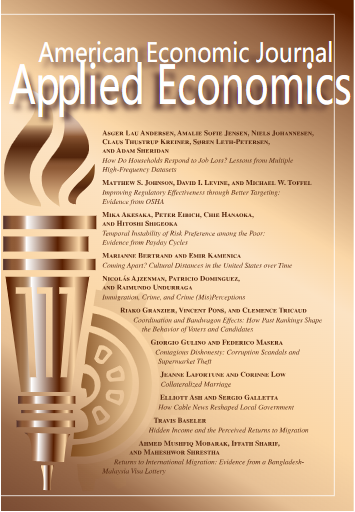协调和从众效应:过去的排名如何塑造选民和候选人的行为
IF 6.2
1区 经济学
Q1 ECONOMICS
引用次数: 0
摘要
候选人在民意调查和过去的选举中的位置可以成为政党和选民强有力的协调工具。在法国两轮选举中使用回归不连续设计,我们表明,在第一轮中排名第一的候选人比排名第二的候选人更有可能继续竞选并获胜。排名第二和第三的影响更大,排名第三和排名第四的影响也更大。它们源于联盟政党就哪位候选人应该退出达成一致,选民协调他们的选择,以及想要投票给获胜者的从众效应。我们在其他19个国家也发现了类似的结果。(凝胶d72, d83, d91, k16)本文章由计算机程序翻译,如有差异,请以英文原文为准。
Coordination and Bandwagon Effects: How Past Rankings Shape the Behavior of Voters and Candidates
Candidates' placements in polls and past elections can be powerful coordination devices for parties and voters. Using a regression discontinuity design in French two-round elections, we show that candidates who place first in the first round are more likely to stay in the race and win than those who placed second. These effects are even larger for ranking second versus third, and also present for third versus fourth. They stem from allied parties agreeing on which candidate should drop out, voters coordinating their choice, and the bandwagon effect of wanting to vote for the winner. We find similar results across 19 other countries. (JEL D72, D83, D91, K16)
求助全文
通过发布文献求助,成功后即可免费获取论文全文。
去求助
来源期刊

American Economic Journal-Applied Economics
ECONOMICS-
CiteScore
9.10
自引率
1.60%
发文量
63
期刊介绍:
American Economic Journal: Applied Economics publishes papers covering a range of topics in applied economics, with a focus on empirical microeconomic issues. In particular, we welcome papers on labor economics, development microeconomics, health, education, demography, empirical corporate finance, empirical studies of trade, and empirical behavioral economics.
 求助内容:
求助内容: 应助结果提醒方式:
应助结果提醒方式:


